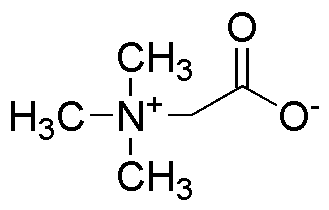Betaine, anhydrous is widely utilized in research focused on:
- Animal Nutrition: Commonly used as a feed additive to enhance growth performance and improve feed efficiency in livestock and poultry, leading to healthier animals and increased production.
- Cosmetics and Personal Care: Incorporated into skincare and haircare products for its moisturizing properties, helping to improve skin hydration and reduce irritation, making it ideal for sensitive skin formulations.
- Pharmaceuticals: Explored for its potential benefits in liver health and metabolic disorders, providing a natural alternative for supporting liver function and reducing homocysteine levels.
- Food Industry: Used as a flavor enhancer and a natural preservative, contributing to improved taste and shelf-life of various food products without the use of synthetic additives.
- Biotechnology: Applied in cell culture media to support the growth of various cell types, enhancing the viability and productivity of cells in research and therapeutic applications.
Informations générales
Propriétés
Sécurité et réglementation
Applications
Betaine, anhydrous is widely utilized in research focused on:
- Animal Nutrition: Commonly used as a feed additive to enhance growth performance and improve feed efficiency in livestock and poultry, leading to healthier animals and increased production.
- Cosmetics and Personal Care: Incorporated into skincare and haircare products for its moisturizing properties, helping to improve skin hydration and reduce irritation, making it ideal for sensitive skin formulations.
- Pharmaceuticals: Explored for its potential benefits in liver health and metabolic disorders, providing a natural alternative for supporting liver function and reducing homocysteine levels.
- Food Industry: Used as a flavor enhancer and a natural preservative, contributing to improved taste and shelf-life of various food products without the use of synthetic additives.
- Biotechnology: Applied in cell culture media to support the growth of various cell types, enhancing the viability and productivity of cells in research and therapeutic applications.
Documents
Fiches de données de sécurité (FDS)
La FDS fournit des informations de sécurité complètes sur la manipulation, le stockage et l’élimination du produit.
Spécifications du produit (PS)
Le PS fournit une description complète des propriétés du produit, notamment sa composition chimique, son état physique, sa pureté et les exigences de stockage. Il détaille également les plages de qualité acceptables et les applications prévues du produit.
Certificats d'analyse (COA)
Recherchez des certificats d'analyse (COA) en saisissant le numéro de lot du produit. Les numéros de lot et de lot se trouvent sur l'étiquette d'un produit, après les mots « Lot » ou « Lot de fabrication ».
Numéro de catalogue
Numéro de lot/série
Certificats d'origine (COO)
Ce certificat d'exploitation confirme le pays dans lequel le produit a été fabriqué, et détaille également les matériaux et composants utilisés et s'il est issu de sources naturelles, synthétiques ou autres sources spécifiques. Ce certificat peut être requis pour les douanes, le commerce et la conformité réglementaire.
Numéro de catalogue
Numéro de lot/série
Fiches de données de sécurité (FDS)
La FDS fournit des informations de sécurité complètes sur la manipulation, le stockage et l’élimination du produit.
DownloadSpécifications du produit (PS)
Le PS fournit une description complète des propriétés du produit, notamment sa composition chimique, son état physique, sa pureté et les exigences de stockage. Il détaille également les plages de qualité acceptables et les applications prévues du produit.
DownloadCertificats d'analyse (COA)
Recherchez des certificats d'analyse (COA) en saisissant le numéro de lot du produit. Les numéros de lot et de lot se trouvent sur l'étiquette d'un produit, après les mots « Lot » ou « Lot de fabrication ».
Numéro de catalogue
Numéro de lot/série
Certificats d'origine (COO)
Ce certificat d'exploitation confirme le pays dans lequel le produit a été fabriqué, et détaille également les matériaux et composants utilisés et s'il est issu de sources naturelles, synthétiques ou autres sources spécifiques. Ce certificat peut être requis pour les douanes, le commerce et la conformité réglementaire.


